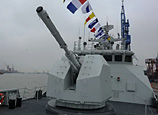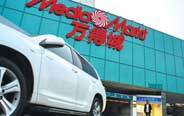
Edited and translated by Liang Jun, People's Daily Online
The European Union attracted almost twice as much Chinese investment as the United States in 2012, and the U.S. political issue is the main reason for hindering Chinese investment in U.S. infrastructure and high-tech sectors, according to a report from New York-based Rhodium Group.
Experts say the U.S. is used to having cold war thinking and poses obstacles to Chinese companies' investment in the U.S., not only frequently using trade protection regulations including anti-dumping and countervailing duty, but also adopting technical barriers to trade with the excuse of national security.
Chinese investment in the US is far less than in the EU
The report shows that, Chinese investment in the U.S. and the E.U. since 2008 has seen rapid increase. Before 2008, Chinese annual investment in the 27 European countries was less than 1 billion U.S. dollars; the figure amounted to 3 billion U.S. dollars during 2009 and 2010 and increased by three times to more than 10 billion U.S. dollars in 2011 and 2012.
Meanwhile, Chinese investment in the U.S. grew from lower than 1 billion U.S. dollars in 2008 to 5 billion U.S. dollars in 2010 and dropped to 4.7 billion U.S. dollars in 2011 and increased to 6.5 billion U.S. dollars in 2012. Nevertheless, Chinese investment in the U.S. is still far lower than that in the E.U.
The European debt crisis has given Chinese investors a number of opportunities.
According to Rhodium, EU countries attracted Chinese investment in utilities and transportation infrastructure, short in capital but with steady growth potential. Through 2012, Chinese State-owned enterprises and sovereign investment bodies put more than $5 billion into those industries, including a stake by China's sovereign-wealth fund in London Heathrow Airport London, while the U.S. attracted almost no investment in transportation infrastructure.
In recent years, China implemented going-out strategy, avoided trade barriers through investment, and at the same time, promoted exports and also created jobs in the host countries to achieve win-win situation. After the euro zone debt crisis, China purchased European companies through investment and realized the maximum benefits of overseas mergers and acquisitions with comparatively low cost and risk, according to Bai Ming, deputy director of the International Market Research Department of the International Trade Economic Cooperation Research Institute under China's Ministry of Commerce.

Read the Chinese version: 美一见中国投资就犯臆想症
Source: People's Daily Overseas Edition; Author: Zhou Xiaoyuan
















 Public letter calls for gay marriage legislation
Public letter calls for gay marriage legislation


![]()
